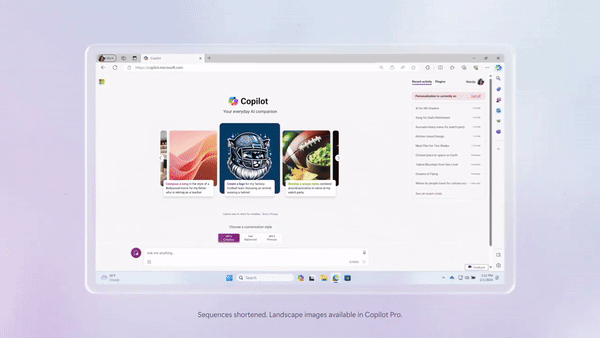A year ago today, Microsoft unveiled its ambitious plans for an AI-powered Bing search engine. It marked a significant milestone for Bing, pushing AI further into the mainstream and sparking discussions about its potential impact. The launch even prompted Google to take notice, feeling pressure to keep up with advancements in artificial intelligence.
“They will definitely want to come out and show that they can dance,” remarked Microsoft CEO Satya Nadella. “And I want people to know that we made them dance.”
The strategy proved successful initially. However, a year later, Bing seems to have faded from the limelight. Google still dominates with over 91 percent of the traditional search market share, while ChatGPT has surged to 100 million weekly users. In contrast, Bing‘s growth in the search market globally has been modest, increasing by less than half a percent.
Despite this, Microsoft doesn’t view the situation as a failure. Yusuf Mehdi, executive vice president and consumer chief marketing officer at Microsoft, “We’ve seen [Bing] share grow.” While the launch may not have completely reshaped the search landscape, Mehdi emphasized that even incremental growth is significant for Microsoft and fosters healthy competition.
However, Microsoft‘s AI ambitions have flourished beyond Bing. In the past year, the company has integrated AI features into various products, including Office apps, Windows applications like Paint, and even introduced a dedicated AI key for laptops. This diversification underscores Microsoft‘s commitment to infusing AI across its ecosystem.
Instead of focusing solely on Bing, Microsoft has shifted its attention to Copilot, an “AI companion” embedded across its key software and services. Following a rebranding effort, Copilot now serves as the centrepiece of Microsoft‘s AI initiatives, emphasizing productivity and creativity rather than just search capabilities.
The unexpected Super Bowl ad for Copilot underscores Microsoft‘s commitment to promoting its AI-driven future. Departing from previous commercials that highlighted Microsoft‘s software and emotional narratives, this ad focuses solely on encouraging users to download the Copilot app on iOS and Android.
“This is a significant shift for a company that has historically been PC-centric,” remarked Mehdi.
The Super Bowl ad highlights the role of AI in fostering creativity while addressing concerns about its potential impact on jobs, particularly in creative fields. It reflects Microsoft‘s evolving approach to AI, moving away from the search battle with Google to position Copilot as a standalone product. Accompanying the marketing push, Microsoft is introducing new Copilot features aimed at enhancing user experience and image creation capabilities. These updates include object highlighting, background blurring, and additional effects for images, all designed to empower users to unleash their creativity.
Despite Copilot‘s popularity, Microsoft has faced challenges in ensuring responsible AI usage. Recent incidents involving the creation of explicit images using AI highlight the need for robust safety measures. Microsoft has responded by strengthening its safety systems to prevent misuse of its AI services.
Beyond image creation, Copilot is widely used for programming, research, and analysis. While search remains a prevalent use case, Microsoft is exploring ways to integrate Copilot more seamlessly into its products and services. The repositioning of Copilot reflects Microsoft‘s vision of a unified AI experience across its ecosystem. By consolidating various Copilot iterations into a single brand, Microsoft aims to simplify user engagement and expand functionality through subscription-based models.

Looking ahead, Microsoft is poised to leverage AI in its upcoming Windows refresh. While specific details remain undisclosed, the focus is on enhancing user productivity and personalizing the computing experience through AI-driven capabilities. A year after its Bing AI launch, Microsoft‘s journey has evolved beyond search dominance. While Bing‘s impact may have been modest, Microsoft‘s broader AI initiatives have propelled the company into new territories, setting the stage for future innovation and growth.
“When we launched, we said we had to start at some place,” reflected Mehdi. “I think we made the right call to start with Bing.”






